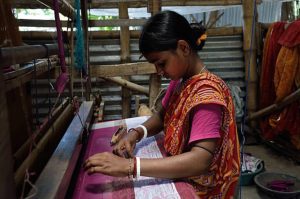Kolkata Leather, Textile, and Tea Industries: In a sharp shift in trade relations, the United States has imposed a 25% tariff on multiple Indian exports, with West Bengal’s leather, textile, and tea industries facing the brunt of the blow. The sudden escalation—likely influenced by India’s continued ties with Russia in arms and energy—threatens to severely disrupt export-dependent businesses in the state and could lead to job losses, price hikes, and lost international orders.
Kolkata, a key hub for all three sectors, is now bracing for ripple effects that could dent its industrial and economic landscape.
Leather Industry: Kolkata’s Global Footprint Under Threat
Kolkata is the epicentre of India’s leather industry, housing major tanning and manufacturing clusters in Topsia, Tiljala, and Bantala. These hubs generate thousands of tonnes of finished leather annually, with a large share destined for the United States.
With the U.S. being one of the largest importers of Indian leather goods, the 25% tariff could drastically undercut pricing competitiveness. Industry stakeholders warn that American buyers may turn to cheaper suppliers in countries like Vietnam, Bangladesh, or Cambodia—nations with either no or lower trade penalties.
According to the Council for Leather Exports, this could result in order cancellations, payment deferrals, and a cascading effect on wages and jobs, especially among the unorganized workforce in Bengal’s leather hubs.
“We’ve worked hard to comply with U.S. environmental and quality standards. This tariff punishes legitimate businesses and pushes trade towards black-market alternatives,” said a tannery owner from Bantala.
Textiles: Bengal’s Looms Struggle to Stay Competitive
Bengal’s handloom and powerloom sectors, with hubs in Howrah, Hooghly, and parts of North Kolkata, are also directly impacted. The tariff makes Indian garments significantly more expensive in U.S. markets.
Major garment exporters—who depend on the U.S. for up to 70% of revenues—are facing an immediate squeeze on profit margins. Several small and medium enterprises (SMEs) have frozen production or laid off contract workers in anticipation of canceled shipments.
“Unlike Bangladesh and Vietnam, we already face basic customs duties in the U.S. With the added 25%, we are pricing ourselves out of the global market,” said a textile exporter from Serampore.
Local governments are exploring emergency trade insurance options and relief packages, though state officials admit that support for every affected unit may be financially unfeasible.

Darjeeling & Dooars Tea: Niche Markets Under Pressure
West Bengal’s iconic Darjeeling and Dooars tea estates produce some of the most premium teas globally. The U.S. is one of the top five buyers for these luxury brews, particularly through speciality retail and gourmet markets.
Though the tea industry is relatively niche compared to leather and textiles, the margins are thin, and any added tariff sharply affects profitability.
“Darjeeling tea is sold in grams, not kilos. We can’t compete with cheaper Sri Lankan or African teas in volume. This tariff may force us to rethink our U.S. strategy entirely,” said a senior member of the Darjeeling Tea Association.
Some plantations are now exploring direct-to-consumer exports via online platforms, or shifting focus to Europe, Japan, and the Middle East.
Economic Fallout: Bengal’s Export Model Faces a Rethink
According to economists and trade experts, the new U.S. tariffs could shave off several hundred crores from Bengal’s annual export revenue. The impact is expected to be uneven, with SME-dominated sectors bearing the heaviest blow.
Clusters like Bantala (leather), Salkia (garments), and Siliguri (tea) rely on seasonal exports. Any disruption could lead to delays in loan repayments, worker retrenchments, and reduced investments for upcoming cycles.
Furthermore, the cumulative impact may pressure Bengal’s logistics, warehousing, and inland transport sectors—all of which support export operations.
Political Response and Policy Reactions
While the Union Commerce Ministry has initiated diplomatic dialogue with U.S. trade representatives, no immediate rollback of the tariffs is expected. In Bengal, Chief Minister Mamata Banerjee has instructed the Industries Department to compile a report on the sector-specific impact and recommend potential subsidies, reliefs, or export diversifications.
The West Bengal Industrial Development Corporation (WBIDC) has floated ideas such as:
- Export re-routing to emerging markets (UAE, UK, Japan)
- Offering incentives for direct online exports
- Skill-based retraining for affected workers
Opposition leaders have criticized both the Centre and State for “inadequate preparedness” and “over-reliance on U.S. markets” despite past trade uncertainties.
UK Free Trade Agreement: A Silver Lining?
India’s recent Free Trade Agreement (FTA) with the United Kingdom has brought some hope. The UK will allow duty-free access for 99% of India’s export lines, including leather, textiles, and tea.
Several Bengal-based exporters have already begun shifting focus to British buyers. However, trade experts caution that transitioning supply chains, meeting UK-specific quality standards, and building buyer confidence will take at least 6–12 months.
What Lies Ahead: Adapt or Collapse?
As the global trade environment becomes increasingly unpredictable, businesses in Bengal are under pressure to become more resilient, diversified, and technologically equipped. Several chambers of commerce are advising members to:
- Build multi-country export portfolios
- Digitize order and payment tracking systems
- Embrace e-commerce models for direct international sales
- Leverage geopolitical windows, such as India-EU trade talks
The central challenge remains balancing this transformation while maintaining affordability and employment for millions tied to Bengal’s traditional industries.
Conclusion: A Defining Moment for Bengal’s Industrial Backbone
The sudden imposition of U.S. tariffs has triggered an economic alarm for Bengal’s key export sectors. What began as a geopolitical move now threatens to disrupt livelihoods, weaken industries, and destabilize local economies.
However, if met with agile policy reforms, global trade realignment, and sector-specific innovation, Bengal’s traditional strengths in leather, textiles, and tea can not only survive—but evolve into stronger, future-ready export engines.
Kolkata Leather, Textile, and Tea Industries: External References for Context
- India–U.S. Trade Snapshot: 2025
- Council for Leather Exports – Official Data
- UK–India Free Trade Agreement – Official Press Release
- Tea Board of India – Export Statistics
Also read: Home | Channel 6 Network – Latest News, Breaking Updates: Politics, Business, Tech & More

